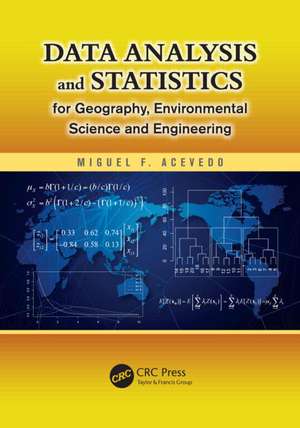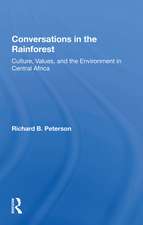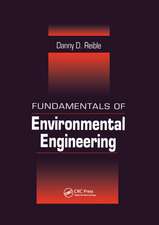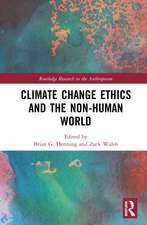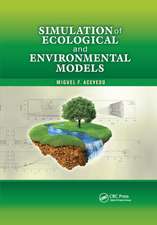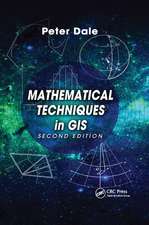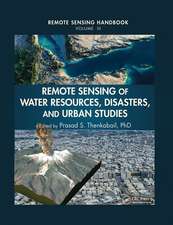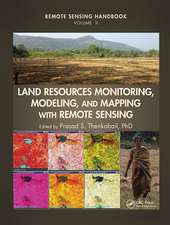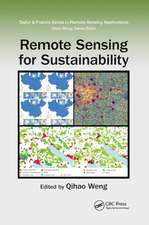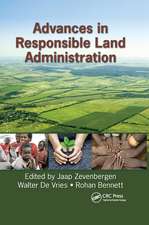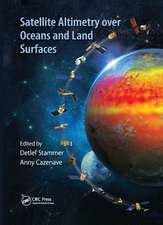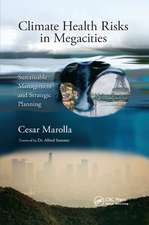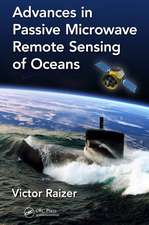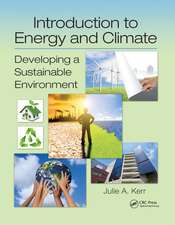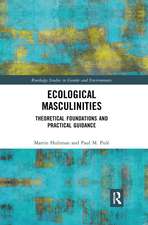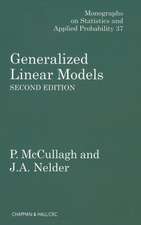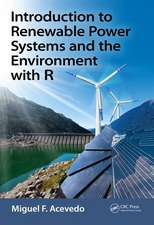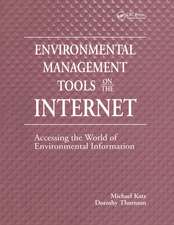Data Analysis and Statistics for Geography, Environmental Science, and Engineering
Autor Miguel F. Acevedoen Limba Engleză Hardback – 7 dec 2012
Learn How to Use a Variety of Data Analysis and Statistics Methods
Based on the author’s many years of teaching graduate and undergraduate students, this textbook emphasizes hands-on learning. Organized into two parts, it allows greater flexibility using the material in various countries and types of curricula. The first part covers probability, random variables and inferential statistics, applications of regression, time series analysis, and analysis of spatial point patterns. The second part uses matrix algebra to address multidimensional problems. After a review of matrices, it delves into multiple regression, dependent random processes and autoregressive time series, spatial analysis using geostatistics and spatial regression, discriminant analysis, and a variety of multivariate analyses based on eigenvector methods.
Build from Fundamental Concepts to Effective Problem Solving
Each chapter starts with conceptual and theoretical material to give a firm foundation in how the methods work. Examples and exercises illustrate the applications and demonstrate how to go from concepts to problem solving. Hands-on computer sessions allow students to grasp the practical implications and learn by doing. Throughout, the computer examples and exercises use seeg and RcmdrPlugin.seeg, open-source R packages developed by the author, which help students acquire the skills to implement and conduct analysis and to analyze the results.
This self-contained book offers a unified presentation of data analysis methods for more effective problem solving. With clear, easy-to-follow explanations, the book helps students to develop a solid understanding of basic statistical analysis and prepares them for learning the more advanced and specialized methods they will need in their work.
| Toate formatele și edițiile | Preț | Express |
|---|---|---|
| Paperback (1) | 494.26 lei 6-8 săpt. | |
| CRC Press – 10 dec 2019 | 494.26 lei 6-8 săpt. | |
| Hardback (1) | 807.69 lei 6-8 săpt. | |
| CRC Press – 7 dec 2012 | 807.69 lei 6-8 săpt. |
Preț: 807.69 lei
Preț vechi: 984.99 lei
-18% Nou
Puncte Express: 1212
Preț estimativ în valută:
154.55€ • 161.80$ • 127.88£
154.55€ • 161.80$ • 127.88£
Carte tipărită la comandă
Livrare economică 05-19 aprilie
Preluare comenzi: 021 569.72.76
Specificații
ISBN-13: 9781439885017
ISBN-10: 143988501X
Pagini: 558
Ilustrații: 320 b/w images, 15 tables and Approx.733 equations
Dimensiuni: 178 x 254 x 30 mm
Greutate: 1.18 kg
Ediția:1
Editura: CRC Press
Colecția CRC Press
ISBN-10: 143988501X
Pagini: 558
Ilustrații: 320 b/w images, 15 tables and Approx.733 equations
Dimensiuni: 178 x 254 x 30 mm
Greutate: 1.18 kg
Ediția:1
Editura: CRC Press
Colecția CRC Press
Public țintă
Undergraduate and graduate students in geography, environmental sciences, and environmental engineering; researchers and environmental professionals working with consultant firms, government agencies, and municipalities or managing natural resources.Cuprins
Part I Introduction to Probability, Statistics, Time Series, and Spatial Analysis: Introduction. Probability Theory. Random Variables, Distributions, Moments, and Statistics. Exploratory Analysis and Introduction to Inferential Statistics. More on Inferential Statistics: Goodness of Fit, Contingency Analysis, and Analysis of Variance. Regression. Stochastic or Random Processes and Time Series. Spatial Point Patterns. Part II Matrices, Tempral and Spatial Autoregressive Processes, and Multivariate Analysis: Matrices and Linear Algebra. Multivariate Models. Dependent Stochastic Processes and Time Series. Geostatistics: Kriging. Spatial Auto-Correlation and Auto-Regression. Multivariate Analysis I: Reducing Dimensionality. Multivariate Analysis II: Identifying and Developing Relationships among Observations and Variables. Bibliography. Index.
Notă biografică
Miguel F. Acevedo has 38 years of academic experience, the last 20 of these as faculty member of the University of North Texas (UNT). His career has been interdisciplinary, especially at the interface of science and engineering. He obtained his Ph.D. in biophysics from the University of California Berkeley and master's degrees in electrical engineering and computer science from Berkeley and the University of Texas at Austin, respectively. Prior to UNT, he was at the Universidad de Los Andes in Merida, Venezuela, where he taught for 18 years. He has served on the Science Advisory Board of the U.S. Environmental Protection Agency and on many review panels of the U.S. National Science Foundation. He has received numerous research grants and written many journal articles, book chapters, and proceedings articles. UNT has recognized him with the Regent’s Professor rank, the Citation for Distinguished Service to International Education, and the Regent’s Faculty Lectureship. For more information, see Dr. Acevedo’s page at UNT.
Descriere
This practical, classroom-tested textbook helps readers learn quantitative methodology, including how to implement advanced analysis methods using an open-source software platform. Based on the author’s many years of teaching undergraduate and graduate students in several countries, the book brings together principles of statistics and probability, multivariate analysis, and spatial analysis methods applied to a variety of geographical and environmental models. Theory is accompanied by practical hands-on computer exercises, progressing from easy to difficult. The text also presents a review of mathematical methods, making the book self-contained.
